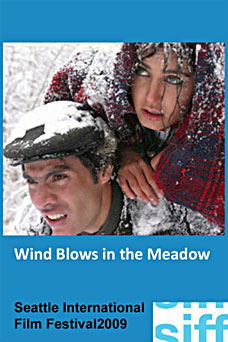
Baseball's Active Leaders, 2023
What Trump Said When About COVID
Recent Reviews
Everything Everywhere All at Once (2022)
Black Panther: Wakanda Forever (2022)
Doctor Strange in the Multiverse of Madness (2022)
Spider-Man: No Way Home (2021)
The Cagneys
A Midsummer Night's Dream (1935)
Something to Sing About (1937)
Angels with Dirty Faces (1938)
A Lion Is In the Streets (1953)
Man of a Thousand Faces (1957)
Never Steal Anything Small (1959)
Shake Hands With the Devil (1959)
Wind Blows in the Meadow (2009)
WARNING: WINDY SPOILERS
You get the feeling something has been lost in translation in the Iranian film “Wind Blows in the Meadow.” The meadow, for example. “Wind Blows Through the Woods” would be a more accurate title but the subtitles screw even this up, calling a patch of snow- and ice-covered trees near a northern Iranian mountain village a “jungle.” Too bad. The wind that blows in the woods is one of the film’s key symbols. It loudly and ominously loosens ice and snow onto the people below. It portends disaster.
The movie begins simply. A man goes into the woods and cuts down a tree with a chainsaw. He’s cutting off its branches when he suddenly screams. It’s rolled over onto him.
A young woman with beautiful dark eyes buys supplies at the local store, then says “Put it on my account,” and gets a nasty look from the proprietor. Outside a young man with Down syndrome tries to give the girl some jewelry, but she regards it, and him, with something between horror and hatred. What’s going on?
Everything falls into place in the next scene. The woodsman, Taleb, is bedridden and in debt, and he’s promised the hand of his daughter, the dark-eyed Shouka, to Shokrollah, the boy with Down syndrome. No, wait, she’s been promised to his father, the old but tough Nasir. No, she has been promised to Shokrollah, who is horribly smitten and wants to kiss her, while she can only regard him with disgust.
OK, so not everything falls into place immediately.
I have to admit, after the family patriarchs finalize the upcoming marriage, and after Shouka’s mother (mother-in-law? aunt?) chastises the girl for refusing to come when called, and then Shouka does, standing there beautiful and defiant, I kind of rolled my eyes. I thought: OK, this is one of those Lifetime-Channel movies for the indie filmgoer. They go pretending to embrace the foreignness of the film but truly embrace its western aspects: in this case, the defiance of a beautiful woman in a backwards, patriarchal (and horribly, horribly foreign) setting. Plus aren’t her scarves gorgeous?
I also knew, from the synopsis, that the plot concerns a Romeo and Juliet type relationship, and so, like women everywhere, I sat back and waited for Romeo to show up.
The film is better than that. It’s more foreign than that. At a tea house, a tailor, Rafie, agrees to do the wedding up fine—suit for the groom, dress for the bride—and one assumes his assistant, Jalil, a vaguely handsome young man with dark hair and high cheekbones, will play Romeo, as he does. But he’s not much smarter than Shokrollah and he’s slow to realize his role in the story. He’s also not that handsome, or interesting, or courageous. You think: She could still do better.
Once Jalil overhears Shouka’s complaints, though, and then sees her in her wedding dress, he concocts a scheme to delay the wedding long enough for Shouka to talk to her aunt, who talks to Taleb, who calls off the wedding. But it turns out the old man, Nasir, and Yahya, his brother (eldest son?), are not to be trifled with. Hell, Jalil barely looks at Shouka before Yahya is threatening him with a knife. Things get fairly lawless, and one wonder if this is a lawless society or if Nasir and Yahya are like the Iranian-village version of the Mafia. That would make Rafie the tailor a kind of Enzo the Baker who performs a favor for the local don...that goes horribly awry.
I like the fact that I don’t know. I don’t know Iranian society, let alone Iranian mountain-village society, so I miss all the cultural signifiers. I’m dropped in the middle of this story, which, sans a chainsaw and truck, could’ve taken place 500 or 1,000 years ago, and am forced to feel my way around.
It’s its very foreignness, in other words, that intrigues. At the same time, what kicks the story into high gear are two of the more ancient and universal lessons we know: beautiful women are coveted; and men are brutal.
—June 11, 2009
© 2009 Erik Lundegaard







